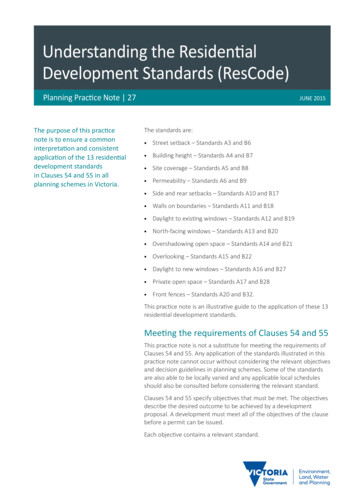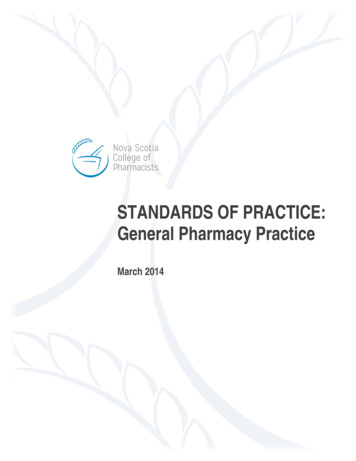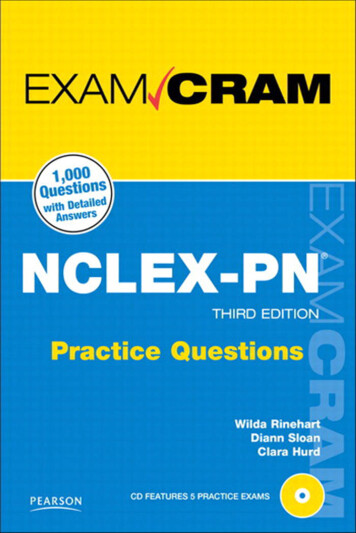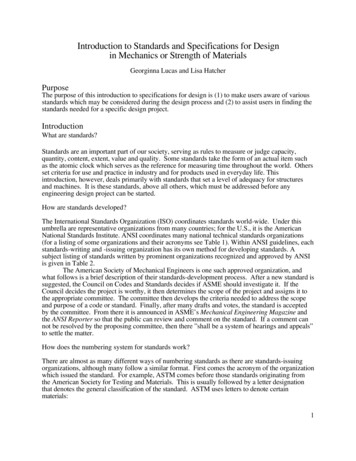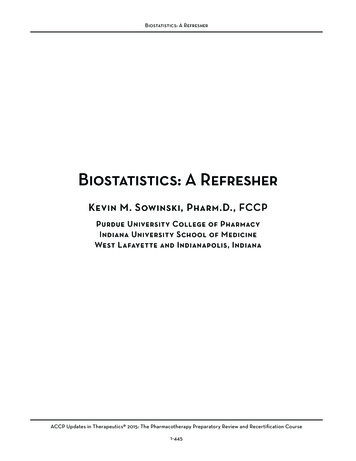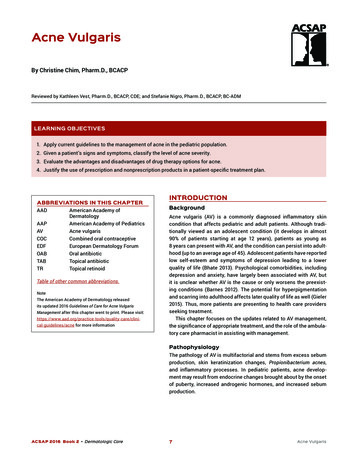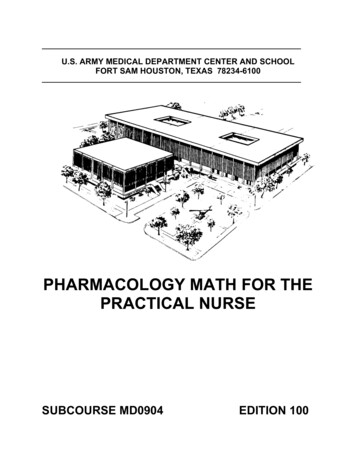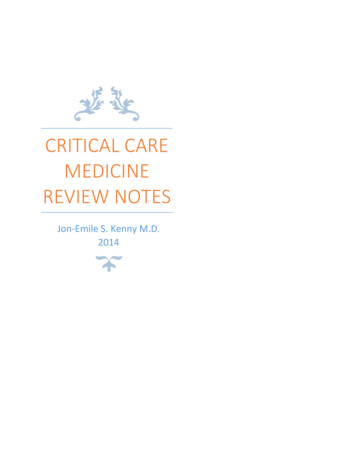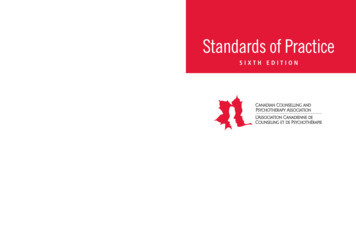
Transcription
Standards of PracticeSixth EditionStandards of Practice 6th EditionISBN 97809697966889 780969 796688
iStandards of PracticeCanadian Counselling andPsychotherapy AssociationStandards of Practice6th EditionApproved byCCPA Board of DirectorsApril 2021
iiStandards of PracticeCopyright 2021 by the Canadian Counselling and Psychotherapy AssociationAll rights reserved.Canadian Counselling and Psychotherapy Association202-245 Menten PlaceOttawa, ON K2H 9E8ISBN 978-0-9697966-8-8Printed in Canada
iiiStandards of PracticeCanadian Counselling andPsychotherapy AssociationStandards of PracticeThe Standards of Practice (2021) was revised from the 2015 edition and updated by a CCPACommittee consisting of:Lorna Martin – ChairGlenn Sheppard – Ethics AmicusJean BlacklerTina NashLouise BlanchardSimon NuttgensJonas BreuhanKathy Offet-GartnerCorrine Hendricken-EldershawThis document and its companion Code of Ethics would not be possible without the collaboration, consultation, and review processes undertaken by the National Board of the CanadianCounselling and Psychotherapy Association and a diverse group of independent volunteerpeer reviewers from across Canada. Of particular importance has been the nuanced reviewsgraciously provided by Indigenous practitioners, Elders, Knowledge Keepers, scholars, authors,and researchers throughout the development process.
Standards of PracticevTable of ContentsPreamble .ixA. Professional Responsibility. 1Relationships with Former Clients.30Sexual Contact with Clients.30General Responsibility.1Multiple Clients: Couple, Family, andGroup Counselling/Therapy.32Respect for Rights .2Multiple Helpers.33Boundaries of Competence.3Group Work.33Professional Impairment.4Referral .34Clinical Supervision and Consultation.4Closure of Counselling/Therapy.34Representation of Professional Qualifications.5Mandated Clients and Systems Approaches .35Professionalism in Advertising.6Responsibility to Counsellors/Therapists andOther Professionals.8C. Assessment and Evaluation . 36Responsibility to Address Concerns Aboutthe Ethical Conduct of Another Professional.8Informed Consent for Assessment andEvaluation.36Supporting Clients When EthicalConcerns Arise.10Assessment and Evaluation Competence.37Third Party Reporting.10Use of Technology in Assessmentand Evaluation.39Sexual Harassment.11Diversity Responsiveness.11Extension of Ethical Responsibilities.11General Orientation.36Administrative and Supervisory Conditions.38Appropriateness of Assessmentand Evaluation.40Professional Will and Client File Directive.12Sensitivity to Diversity When Assessingand Evaluating.41B. Counselling Relationships. 14Reporting Assessment and Evaluation Results.42Primary Responsibility.14Reporting Assessment and EvaluationResults to Third Parties.42Confidentiality.14Children and Confidentiality.16Duty to Warn.17Client’s Rights and Informed Consent.18Integrity of Instruments and Procedures.43Researcher Responsibility .45Touch in Counselling/Therapy.19D. Professional Research and KnowledgeTranslation . 45Children and Persons with Diminished Capacity.20Participant Welfare.47Maintenance of Records.22Informed Consent and Recruitment ofResearch Participants .48Access to Records .25Multiple Relationships3.26Respecting Inclusivity, Diversity, Difference, andIntersectionality.28Consulting with Other Professionals.29Voluntary Participation.48Research and Counsellor/Therapist Education .49Research Participant Right to Confidentiality .50
viStandards of PracticeUse of Confidential Information forDidactic or Other Purposes.50G. Counsellor/Therapist Educationand Training . 76Research Data Retention.51General Responsibility.76Further Research.52Boundaries of Competence.77Research Sponsors .52Ethical Orientation .77Review of Scholarly Submissions .52Clarification of Roles and Responsibilities.78Reporting Research Results.53Program Orientation.79Acknowledging Research Contributions.53Relational Boundaries.80Submission for Publication.54Confidentiality.80E. Clinical Supervision Services . 55General Responsibility .55Informed Consent and Confidentiality.58Boundaries of Competence.59Ethical Commitment .60Clarification of Roles and Responsibilities.60Welfare of Clients and Protection of the Public.62Self-Development and Self-Awareness.81Dealing with Personal Issues.81Self-Growth Activities.81Sexual Contact with Students and Trainees.82Sexual Intimidation or Harassment.83Scholarship.83Establishing Parameters ofCounselling/Therapy Practice.84Gatekeeping.62Clinical Supervision Orientation .63Fees .64Relational Boundaries.64Due Process and Remediation.66Self-Development and Self-Awareness.67Self-Care.68Diversity Responsiveness .69F. Consultation Services . 70General Responsibility.70Undiminished Responsibility and Liability .71Consultative Relationships.72Fees and Billing Arrangements.72Informed Consent.73Respect for Privacy.73Recordkeeping for Consultation Services.74Conflict of Interest.74Sponsorship and Recruitment.75H. Use of Electronic and OtherTechnologies . 85Technology-Based Administrative Functions.85Permission for Technology Use.85Purpose of Technology Use.86Technology-Based Service Delivery.86Technology-Based Counselling/TherapyEducation.87Personal Use of Technology.88Jurisdictional Issues.88I. Indigenous Peoples, Communities,and Contexts . 90Awareness of Historical andContemporary Contexts .90Reflection on Self and PersonalCultural Identities.91Recognition of Indigenous Diversity .92Respectful Awareness of Traditional Practices.92Respectful Participation in Traditional Practices. 93
Standards of PracticeStrengths-Based Community Development.94Relevant Cross-Cultural Practice.95Relationships.96Culturally and Ethically ReciprocalRelationships.96Appropriate Use of Traditional Knowledgeand Cultural Teachings.97Honouring Client Autonomy.98J. P ractice Standards as the Beginningof a Journey with Indigenous Peoplesand Communities. 99viiK. Obtaining Ongoing Informed Consent. 101L. Guidelines for Dealing withSubpoenas and Court Orders. 103M. Guidelines for the Conduct ofCustody Evaluations . 105References. 106General References.106Section References.107Glossary of Terms. 114
Standards of PracticeixPreambleThese practice standards were developed by the Canadian Counselling and PsychotherapyAssociation to provide direction and guidelines to enable its members, and other counsellorsand psychotherapists in Canada1, and counsellors/therapists-in-training, to conduct themselvesin a professional manner consistent with the CCPA Code of Ethics. They are also intended toserve the following purposes: support statutory and professional self-regulation by establishing a shared set ofexpectations related to the many areas of counselling/therapy-related activities andresponsibilities; protect the public by establishing a set of expectations for quality counselling/therapyservices and for the maintenance of counsellor/therapist accountability; establish a set of expectations for ethically competent professional behaviour whichcounsellors/therapists may use to monitor, evaluate, and work to improve their professional practices; serve as the foundation for addressing professional queries and ethics-relatedcomplaints; and, establish expectations for counsellor/therapist education, supervision, and to providesupport for ongoing professional development.It is important to note that these practice standards are directly aligned to but distinct fromthe CCPA Code of Ethics. They contain a set of broad professional values and principles fromwhich counsellors/therapists make professional judgments and decisions. The CCPA Standardsof Practice provide action-based guidelines. Counsellors/therapists are expected to adhere toboth the CCPA Code of Ethics and CCPA Standards of Practice.These practice standards are directed primarily at the professional conduct of counsellors/therapists. However, they extend to the personal actions of counsellors/therapists when theirbehaviour undermines society’s trust and confidence in the integrity of the profession andwhen there is reasonable doubt about the ability of a counsellor/therapist to act in a professionally competent and ethical manner.The standards of practice provisions in this document are more fully understood and theirnuanced application to various areas of professional practice better appreciated when usedin combination with each other and with the CCPA Code of Ethics. Multiple new lenses arerequired to make full, contextualized use of the 2021 CCPA Standards of Practice. One overarching lens that has recently emerged is the expanded use of electronic and other technologyfor the delivery of counselling/therapy, supervision, and consultation, which poses unique risksand opportunities throughout the full range of professional practices. Other overarching lensesare those of social justice, self-reflection, and diversity. The importance of the Calls to Actionby the Truth and Reconciliation Commission (2015) has been acknowledged and these 2021practice standards begin the process of addressing these calls as well as those of the United1Throughout this publication, the term counsellor/therapist shall refer to various titles used by practitioners involved inthe activity of counselling including, but not restricted to, the terms psychotherapist, counselling therapist, mental healththerapist, clinical counsellor, career counsellor, conseiller/conseillère d’orientation, vocational guidance counsellor,marriage and family therapist, orienteur, orienteur professionnel, and psychoéducateur.
xStandards of PracticeNations Declaration of Rights of Indigenous Peoples (UNDRIP, 2007). Approaching all clientswith humility and from a place of not-knowing is a core value reflected in these standards.Counsellors /therapists are encouraged to familiarize themselves with the TRC’s reports, theCalls to Action, and the UN Declaration.Throughout Standards of Practice, there are textboxes containing informational highlightsinserted to succinctly capture some core ethical concept, an ethical principle or concept fromcase law, and to add authentic voices to enrich meaning. These insertions are intended to reflectsome of the richness and diversity of the historical and contemporary strivings that constitutethe ethical and legal grounding for our professional code of conduct.All of the practice standards are pinned to the generic entry-to-practice level as determined bythe nationally validated competency profile for the counselling/therapy profession in Canada.Because the practice standards are generic in nature, they do not anticipate every practice situation, modality of practice, or address all ethical challenges with which counsellors/therapists areconfronted. Therefore, the development of standards will necessarily remain an ongoing responsibility to which all counsellors/therapists can contribute. Despite the value of these practicestandards, the ultimate responsibility for acting ethically depends on the integrity and commitment of each counsellor/therapist to do so.
1Standards of PracticeA. Professional ResponsibilityCODE OF ETHICSSTANDARDS OF PRACTICEA1General rapists maintain high standards of professionalcompetence by attending to their personal well-being, participating in continuing professional education and development, andsupporting the development and delivery of continuing educationwithin the counselling/therapy profession.Counsellors/therapists maintainhigh standards of professionalcompetence and ethical behaviourand recognize the need forcontinuing education andpersonal care in order to meet thisresponsibility. (See also C1, E1,E11, F1, G2, Section I)Counsellors/therapists invest time and effort in understandingthe CCPA Code of Ethics and Standards of Practice. Theyavoid practice contexts and circumstances in which they wouldknowingly have to violate these ethical requirements. If, however,counsellors/therapists discover a conflict between existing oremerging organizational policies and their ethical obligations,they commit to educating others in the setting about the ethicaldilemma and work to achieve alignment between the policiesand ethically congruent practice.Counsellors/therapists should become familiar with theCanadian Charter of Rights and Freedoms and, as relevantto their professional setting and services provided, review thefollowing federal and provincial/territorial legislation: mental health acts child protection acts public schools/education administration acts privacy acts criminal codes marriage, divorce and matrimonial property acts criminal youth justice act freedom of information acts mediation acts professional statutory regulationsCounsellors/therapists provide fair, equitable, and timely services,using only those therapies that are legal, ethical, helpful, evidenceinformed and within their scope of practice and boundaries ofcompetence.
2Standards of PracticeA2Respect for RightsRespect for RightsCounsellors/therapists understand and respect the rights andfreedoms of those with whom they work and others, particularly those who may be disenfranchised or negatively affected bypolitical, personal, social, economic, or familial histories that maycontinue to resonate across the lifespan. These circumstances mayinclude, but are not restricted to, colonization, poverty, oppression,violence, structural injustice, systemic racism, war, or discriminatory practices.Counsellors/therapists participatein only those practices that arerespectful of the legal, civic, moral,and human rights of themselvesand others, and act to safeguardthe dignity and rights of theirclients, students, supervisees, andresearch participants. (See alsoD1, D9, E1, Section I)Counsellors/therapists convey respect for human dignity, principlesof equity, and social justice. They speak out or take other appropriateactions against practices, policies, laws, and regulations that directlyor indirectly bring harm to others or violate their human rights.Counsellors/therapists refrain from providing professional information to individuals who have expressed an intention to use itto violate the human rights of others. This standard of practicemay NOT be interpreted or used to justify or defend any humanrights violation.Counsellors/therapists practice in a manner congruent with theoverarching principles of the Universal Declaration of HumanRights, the UN Convention on the Rights of the Child and the UNDeclaration on the Rights of Indigenous Peoples to which Canadais a signatory.Counsellors/therapists respect due process and demonstratecommitment to the principles of social justice by honouringdiversity, upholding human rights, fostering inclusivity, workingto establish equity, and seeking to ensure access to resourcesfor all. They espouse social justice perspectives and practices inall of their paid and volunteer professional activities, includingcounselling/therapy, assessment and evaluation, clinical supervision, consultation, counsellor/therapist education, research, andprofessional writing, adjudication, and review.Fiduciary RelationshipA fiduciary relationship is one founded on trust or confidence relied on by one person in the integrity and fidelity ofanother. A fiduciary has a duty to act primarily for the client’s benefit in matters connected with the undertaking and notfor their own personal interest.Black’s Law Dictionary (2004)
3Standards of PracticeA3Boundaries of CompetenceBoundaries ofCompetenceCounsellors/therapists restrict their counselling/therapy servicesto those areas within the boundaries of their competence byvirtue of verifiable education, training, supervised experience, and other appropriate professional experience. They alsorestrict their services based on their role and function, their legalauthority, and their jurisdiction of employment.Counsellors/therapists limit theircounselling/therapy services andpractices to those which are withintheir professional competenceby virtue of their education andprofessional experience, andconsistent with any requirementsfor provincial/territorial andnational credentials. They seeksupervision, consult with and/orrefer to other professionals whenthe counselling needs of clientsexceed their level of competence.(See also C3, C4, D1, E4, E6, F1, F2,G2, G14, H4, Section I)Counsellors/therapists who wish to extend their professionalservices ensure competence in any additional areas of expertisethrough extra verifiable education or training in these areas andprovide service only after they have secured adequate supervision from supervisors with demonstrative expertise in thepractice area. Supervisors should have a high level of expertisein the area that is certified by an independent process such as:certification, registration, licensing, or similar independentprocess that is overseen by an Elder or knowledge keeperrecognized by community when the expertise is related toIndigenous competencies.When counsellors/therapists are faced with clients whose needsexceed the counsellors/therapists’ boundaries of competence,they make appropriate referrals for their clients. Counsellors/therapists provide appropriate contact and support for theirclients during any transitional period associated with referringthem to other sources of professional help.When counsellors/therapists find themselves in circumstancesin which access to referral agents and resources is limited, theyseek consultation. For instance, rural and remote practice tendsto be broader, more generalist, and more eclectic than is thecase for practitioners in more densely populated areas. This isbecause of the wide range of client issues that must be addressedby limited resources. Counsellors/therapists living and workingin rural and remote communities need to remain cognizant ofthe limits to their competence while working in communitiesthat have few, if any, referral possibilities, including communitiessuch as those that are closed, enclaved, isolated, rural, northern,or remote. Taking advantage of electronic means of consultation,referral, continuous learning, and supervision, where available, isrecommended.Since consultation with the other professional or communityrecognized Elders is often necessary to provide the best servicesfor clients, all contributing helping professionals may agree,with the explicit informed consent of clients, to collaboratewith each other.
4Standards of PracticeStandard of CareCounsellors/therapists provide their professional services to a level consistent with the degree of skill, knowledge,and ethics ordinarily possessed and provided by the average prudent reputable member of the profession in similarcircumstances in the community.(Adapted from Lanphier v. Phipos, 1833)Professional ImpairmentCounsellors/therapists should take steps to appropriatelylimit their professional responsibilities when their physical,mental, spiritual, or personal circumstances are such that theyhave diminished capacity to provide competent services to allor to particular clients. Counsellors/therapists in such situations must seek consultation and supervision and may need tolimit, suspend, or terminate their professional services. Sinceimpairment may affect the capacity of counsellors/therapistsfor personal insight and self-regulation, colleagues and othersmay find it necessary to contact appropriate personnel and/or aregulatory body.A4Clinical Supervision and ConsultationSupervision andConsultationAll counsellors/therapists should obtain supervision and/orconsultation for their counselling/therapy practices. This isparticularly true with respect to doubts or uncertainties, whichmay arise during their professional work.Counsellors/therapists seeksupervision and consultationacross the career span to supportand enrich their ongoing professional development. Supervisionand consultation are warrantedespecially when counsellors/therapists are confronted withdilemmas or uncertainties, andwhen they are developing anew practice area or updatingknowledge and skills related to aformer area of practice. (See alsoB10, C4, C7, Section E, Section F,I5, I9, I10)In school settings, counsellors/therapists should arrange regular,qualified supervision and/or consultation with other counsellors/therapists in their school or in their school district or region wherever possible, and make arrangements for supervision elsewhere ifnot locally available. Counsellors/therapists in other agencies/institutions and/or in private practice should organize their supervision with other qualified professionals who have documented anddemonstrated expertise in relevant areas of practice (e.g., setting,clientele, referral issues, approaches employed).Counsellors/therapists have an obligation to be appropriatelyaccountable to their employers for their professional work.Supervision of counsellors/therapists should be conducted bysomeone other than a person who is responsible for evaluatingtheir work (such as a person in a line management position). Ifsuch a situation cannot be avoided, then the counsellor/therapistshould also have access to independent opportunities for supervision and/or consultation.
5Standards of PracticeSchool counsellors often face challenges in the area of clinicalsupervision, particularly when they are the only school counsellorin the school building and do not have the opportunity to besupervised by other counsellors/therapists in their school districtor region. This challenge is also true of many counsellor/therapistsin private practice and in many other areas. Online supervisionmay offer an effective strategy for addressing these challenges.When counsellors/therapists seek professional consultation, theymake every effort to do so in ways that will protect the identityof the client. If the client’s identity cannot be protected, then theclient’s informed consent must be sought before the consultation. When consulting, counsellors/therapists make every effortto ensure that the identity of the client will not create any dualrelationship dilemmas for the person with whom they consult.Administrative assistants, supervisors, and all others who workwith counsellors/therapists’ confidential records have a responsibility similar to that of the counsellors/therapists with respectto confidentiality. Counsellors/therapists must take all necessarysteps to guarantee that client confidentiality is respected andmaintained by others with whom they work and consult.A5Representation of Professional QualificationsRepresentation ofProfessionalQualificationsCounsellors/therapists should display their CCC certificate and/or any professional regulatory certificate in a prominent locationat their work site and place their Code of Ethics in the waitingroom at their work site or display it in any other manner thatwould allow it to be readily seen by consumers of their professional services. For Indigenous persons and other persons forwhom humility may inhibit such actions, it would be appropriateto have the credentials available upon request, have a visiblerecognition that CCC regulations are followed, and have theCode of Ethics document on display.Counsellors/therapists claim orimply only those professionalqualifications that they possessand are responsible for correctingany known misrepresentationof their qualifications by others.Counsellors/therapists workingin a province or territory withprofessional statutory regulationensure they adhere to the specificrepresentation of professionalqualifications requirements thathave been mandated by statuteand/or Regulatory College bylaw.(See also H7, I5)Counsellors/therapists shall not use CCPA membership and/or any other professional membership as a designation onbusiness cards, door plates, in advertisements, directories, noruse it in any other way intended to advertise their professionalservice unless it is clearly stipulated that the member possessesa Canadian Certified Counsellor (CCC) designation. Thisdistinction is required because membership admission doesnot evaluate a member’s qualifications to practice counselling/therapy, whereas the certification process does. Where provincialcertification/licensure exists, counsellors/therapists may also usethese designations to advertise their professional service, and
6Standards of Practiceonly in accordance with the statutory regulations pertaining tothe use of professional designations.When counsellors/therapists are involved in public activities,including the making of public statements, they do so in such away that clarifies whether they are acting as private citizens, asdesignated spokespersons of a particular professional body, or asrepresentatives of the counselling/therapy profession.Counsellors/therapists shall not misrepresent nor falsely enhancetheir professional qualifications, experience, or performance.When counsellors/therapists become aware of misuse or misrepresentation of their work, they take reasonable steps to correct orminimize the misuse or misrepresentation.Counsellors/therapists avoid making public statements that arefalse, deceptive, or misleading. For example, it would be inappropriate for graduates from a counselling/therapy specialtyprogram housed in an educational psychology department tocreate and use a title such as “counselling psychologist” to refer tothemselves. Associations and regulatory colleges have protectedtitles that must only be used by individuals with permission touse those titles. Counsellors/therapists also avoid other statements that could easily be misunderstood by virtue of what theysay about their professional qualifications and services or by whatthey neglect to say about them.Counsel
StandardS of Practice iii Canadian Counselling and Psychotherapy Association _ Standards of Practice _ The Standards of Practice (2021) was revised from the 2015 editio


